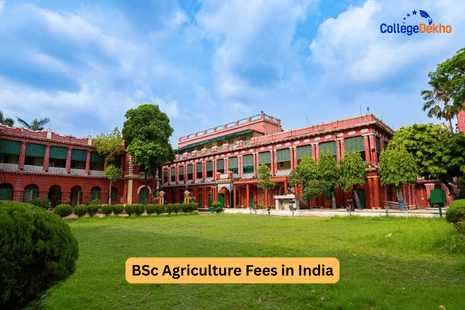- Government vs Premium Institutes BSc Agriculture Fees in India
- BSc Agriculture Fees in Government Colleges 2026
- BSc Agriculture Fees in Premium Institutes 2026
- Scholarships for BSc Agriculture in Government vs Premium Institutes
- Agriculture Scholarships in Government Colleges
- Agriculture Scholarships in Premium Institutes
- Colleges with Low Fees for BSc Agriculture
- Faqs

The Agriculture industry is buzzing with opportunities in government jobs, agritech and scientific innovation, and this is the right time to join the booming Agriculture sector. So if you are planning to pursue Agriculture studies in 2026, then this is the first article you should read. It will not only help you in shortlisting universities but also prepare your finances mindfully, because college fees in India can vary a lot depending on the type of institution.
Government colleges are usually easy on the pocket, with yearly fees somewhere between INR 10,000 and INR 50,000. On the flip side, private or 'premium' institutes often charge between INR 1,00,000 and INR 3,00,000, depending on the facilities they offer.
If you have excellent scores, belong to an EWS category or are under a reserved category like SC, ST or OBC, you may also get fee waivers or scholarships in both government and private universities.
This article will guide you on everything you need to know, from fee comparisons to scholarship options, so you can make a clear and confident decision about your agricultural education.
Also Read:
| BSc Agriculture Admissions 2025-26 | List of Top Private Colleges for BSc Agriculture |
|---|---|
| BSc Agriculture Entrance Exam Dates 2025 | How to Get Admission in B.Sc Agriculture without Entrance Exam? |
Government vs Premium Institutes BSc Agriculture Fees in India
When planning your BSc Agriculture journey, one of the biggest factors that will shape your overall expenses is the type of college you choose. Government colleges are generally backed by public funding, which helps keep their fees quite low. In contrast, private or premium institutes usually cost much more. That’s mainly because they invest heavily in modern infrastructure, advanced labs, specialised courses and overall campus experience.
| Govt Agriculture Colleges | Approx. Annual Fee in INR | Premium Agriculture Colleges | Approx. Annual Fee in INR |
|---|---|---|---|
| Punjab Agricultural University (PAU) | 70,000-80,000 | Lovely Professional University (LPU) |
1,50,000-2,00,000
|
| GB Pant University of Agriculture & Technology | 40,000-50,000 | Shoolini University |
1,40,000-1,80,000
|
| Tamil Nadu Agricultural University (TNAU) | 45,000-55,000 | Amity University | 1,20,000-1,60,000 |
| Acharya N.G. Ranga Agricultural University (ANGRAU) | 25,000-35,000 | Sam Higginbottom University of Agriculture, Technology and Sciences (SHUATS) | 1,00,000-1,40,000 |
| Chaudhary Charan Singh Haryana Agricultural University (CCSHAU) | 28,000-38,000 | Kalasalingam Academy of Research and Education | 1,00,000-1,30,000 |
BSc Agriculture Fees in Government Colleges 2026
If you're aiming for quality education without spending too much, government agricultural colleges are definitely worth considering. These institutions are funded by the state, which helps them keep fees low while still offering solid academic programs. For students serious about building a future in agriculture, they strike a great balance between affordability and value.
Punjab Agricultural University (PAU)
PAU has played a major role in shaping India’s Green Revolution and continues to be one of the most respected names in agricultural education. Known for its forward-thinking research and strong academic framework, the university also boasts a sprawling campus with excellent facilities. For many students with a passion for agriculture, PAU remains a top choice and a dream destination.
- Approx. Annual Fees: INR 70,000-80,000
- Courses Offered: BSc (Hons) Agriculture, BSc (Hons) Horticulture, BTech in Agricultural Engineering.
GB Pant University of Agriculture & Technology
GB Pant University holds the distinction of being India’s first agricultural university, and its legacy speaks volumes. With a wide, well-equipped campus and a team of experienced faculty, the university offers more than just classroom learning. Its blend of theory and real-world practice helps students build skills that translate into diverse job opportunities across the agricultural sector.
- Approx. Annual Fees: INR 40,000-50,000
- Courses Offered: BSc (Hons) Agriculture, BSc in Food Technology, B.V.Sc. & A.H.
Tamil Nadu Agricultural University (TNAU)
TNAU stands out as one of the leading agricultural universities in South India, especially for its strong research in fields like biotechnology, horticulture and agri engineering. What makes it truly special is its close connection with local farming communities. Students here don’t just study, they get hands-on experience through real-world research and outreach work that has a meaningful impact.
- Approx. Annual Fees: INR 45,000-55,000
- Courses Offered: BSc (Hons) Agriculture, BSc (Hons) Horticulture, BSc (Hons) Forestry, BSc (Hons) Sericulture.
Acharya N.G. Ranga Agricultural University (ANGRAU)
ANGRAU is one of the largest agricultural universities in the country and plays a key role in advancing farming across Andhra Pradesh. The university focuses on developing eco-friendly techniques and region-specific solutions that suit the state’s diverse climates. It also places strong emphasis on rural development and makes agricultural education more accessible to the children of farmers.
- Approx. Annual Fees: INR 25,000-35,000
- Courses Offered: BSc (Hons) Agriculture, BTech in Food Technology, BSc (Hons) Community Science.
Chaudhary Charan Singh Haryana Agricultural University (CCSHAU)
CCSHAU is widely regarded as one of North India’s top agricultural universities. It has made significant contributions in areas like crop improvement and animal science. Backed by strong research infrastructure and a focus on innovation, the university prepares its students to tackle modern agricultural challenges and contribute meaningfully to food security and sustainable farming.
- Approx. Annual Fees: INR 28,000-38,000
- Courses Offered: BSc (Hons) Agriculture, BSc (Hons) Community Science, BTech in Agricultural Engineering.
| List of Agriculture Courses after Class 12 | Diploma Courses in Agriculture after Class 10 |
|---|
BSc Agriculture Fees in Premium Institutes 2026
Private and premium institutes offer a very different college experience. These colleges often come with high-end facilities, smaller student batches and strong industry connections. While their fees are significantly higher, they make up for it with advanced labs, international exposure and often better support when it comes to internships and placements in the agriculture field.
Lovely Professional University (LPU)
LPU’s School of Agriculture has earned a strong reputation among private institutions in India. What sets it apart is its focus on technology-backed learning and close industry partnerships. The campus features modern labs and functional farms that give students real-world exposure. With a curriculum built for global relevance, the university prepares its graduates for careers that go beyond just local opportunities.
- Approx. Annual Fees: INR 1,50,000-2,00,000
- Courses Offered: BSc (Hons.) Agriculture, BSc Food Technology, Integrated BSc MSc programs.
Shoolini University
Shoolini University is located in the Himalayas and offers a unique place to study agriculture. It is known for doing cutting-edge research in the fields of biotechnology and agricultural sciences. The university's research-based curriculum encourages students to come up with new ideas and businesses, and it also encourages them to come up with ways to solve problems in modern farming.
- Approx. Annual Fees: INR 1,40,000-1,80,000
- Courses Offered: BSc (Hons) Agriculture, BSc (Hons) Food Technology, BSc Biotechnology.
Amity University
Amity’s Institute of Organic Agriculture blends age-old farming practices with modern scientific thinking. The program is designed to meet the rising demand for professionals who understand organic and sustainable agriculture in depth. Students here learn from seasoned faculty, make use of well-equipped facilities and benefit from industry connections that often open doors to promising job opportunities.
- Approx. Annual Fees: INR 1,20,000-1,60,000
- Courses Offered: BSc (Hons) Agriculture, BSc Agro Informatics, BSc in Food Technology.
Sam Higginbottom University of Agriculture, Technology and Sciences (SHUATS)
SHUATS, a prominent Christian minority university, has built a strong reputation over the years for its commitment to agricultural education. Its vast campus includes expansive farmland and dedicated research zones, offering students plenty of hands-on learning opportunities. With a strong focus on rural development and a wide range of specialised programs, the university continues to serve as a hub for agricultural innovation and community impact.
- Approx. Annual Fees: INR 1,00,000-1,40,000
- Courses Offered: BSc (Hons) Agriculture, BSc (Hons) Horticulture, BSc in Animal Husbandry & Dairying.
Kalasalingam Academy of Research and Education
Kalasalingam University has earned recognition for its emphasis on research and forward-thinking approaches in agriculture. Its School of Agriculture offers a modern, industry-aligned curriculum backed by well-equipped labs and practical training. Students gain hands-on experience in fields like agribusiness and food processing, helping them build the skills needed for diverse careers in the agricultural sector.
- Approx. Annual Fees: INR 1,00,000-1,30,000
- Courses Offered: BSc (Hons) Agriculture, BTech in Food Technology.
Scholarships for BSc Agriculture in Government vs Premium Institutes
Paying for college can feel overwhelming, but scholarships often help lighten the load. If you're planning to pursue a BSc in Agriculture, you’ll find plenty of financial aid options across India. That said, the kind of support you get can vary quite a bit depending on whether you’re studying at a government university or a top private institute. Here’s a simple comparison to help you understand what’s available and what might work best for your goals in agriculture.
| Govt Colleges Scholarships Types | Private Colleges Scholarships Types |
|---|---|
| ICAR AIEEA Scholarship | Merit-Based Admission Scholarships |
| State Government Schemes | Entrance Test-Based Scholarships |
| Category-Based Scholarships | Special Category Scholarships |
| Merit-cum-Means Scholarships | Corporate and NGO Tie-ups |
| Stipends/Waivers | Financial Aids |
Agriculture Scholarships in Government Colleges
Government agricultural universities offer several scholarship opportunities, with most funding coming from either central or state-level initiatives. These scholarships are designed to make education more inclusive, especially for students from lower-income families or underrepresented communities. The overall focus is to support deserving students and encourage more young people to take up careers in agriculture.
ICAR AIEEA Scholarship
This scholarship is provided by the Indian Council of Agricultural Research (ICAR). One of the most well-known programs under this is the National Talent Scholarship (NTS), which supports students who gain admission to a university outside their home state through the AIEEA UG exam. Eligible students receive a monthly stipend, usually around INR 2,000-3,000, to help cover basic living expenses.
State Government Schemes
Many states run their own scholarship programs tailored to local students. One example is the 'Mukhyamantri Kisan Kalyan Yojana', which supports children of farmers pursuing agricultural degrees. These scholarships are usually based on financial need, and applicants are required to submit income certificates or related documents to qualify.
Category-Based Scholarships
Reserved category students, including SC, ST and OBC candidates, can access financial support through schemes like the Post Matric Scholarship Program. These scholarships may offer full tuition fee waivers, regular stipends or reimbursements depending on the student’s academic progress and financial situation.
Merit-cum-Means Scholarships
These are awarded to students who perform well academically but come from families with limited financial resources. Many government universities offer this kind of support, and eligibility is typically based on both performance in previous exams and documented household income.
Stipends/Waivers
In most government colleges, financial aid comes in the form of fixed monthly stipends, annual grants or fee waivers. Since tuition fees in these colleges are already quite low, even partial aid can significantly ease the burden on students and their families.
Also Read:
| ICAR UG Admission Through CUET | Govt Jobs After BSc Agriculture |
|---|
Agriculture Scholarships in Premium Institutes
Premium private institutes use scholarships as a strategic tool to attract meritorious students who might otherwise opt for government colleges. Their scholarships are often more extensive in monetary value and are primarily based on academic performance in school or entrance exams.
Merit-Based Admission Scholarships
This is the most common form of scholarship in private universities. Institutes like Lovely Professional University (LPU), Shoolini University and Amity University offer significant tuition fee waivers based on a student's Class 12 board examination scores. Example: A student with 95% or above in Class 12 could receive a 100% tuition fee waiver, while someone with 90 94.9% might get a 50% waiver. These percentages vary by institute.
Entrance Test-Based Scholarships
High scores in the university's own entrance test (like LPU NEST) or national-level exams like the CUET (Common University Entrance Test) can also make a student eligible for substantial scholarships.
Special Category Scholarships
Many private institutes offer financial aid to specific groups, such as:
- Wards of Defence Personnel
- Students with disabilities
- Students who excel in sports or extracurricular activities
- Scholarships for single girl children.
Corporate and NGO Tie-ups
Some premium universities partner with corporations and NGOs to offer sponsored scholarships. For example, the Corteva Agriscience Scholarship Program supports female students pursuing agriculture in select colleges.
Financial Aids
The financial aid in premium institutes is almost always a percentage-based waiver on their high tuition fees. While this can amount to a large sum, students often still need to cover other costs like hostel fees, examination fees and living expenses.
Also Read:
| NIRF Agriculture Universities 2025 | List of Agricultural Courses in India |
|---|
Colleges with Low Fees for BSc Agriculture
Pursuing a quality BSc Agriculture degree doesn’t always mean spending a fortune. Several top government and state universities across India provide strong academic programs at a fraction of the cost, often well below ₹1 lakh per year. This makes agricultural education far more accessible for students from all backgrounds and ensures that financial limits don’t get in the way of building a solid career in the field.
College/University | Approximate Annual Tuition Fee (INR) |
|---|---|
GB Pant University of Agriculture & Technology, Pantnagar | 40,000-50,000 |
Acharya N.G. Ranga Agricultural University, Guntur | 25,000-35,000 |
Punjab Agricultural University, Ludhiana | 70,000-80,000 |
Tamil Nadu Agricultural University, Coimbatore | 45,000-55,000 |
Chaudhary Charan Singh Haryana Agricultural University, Hisar | 28,000-38,000 |
Government institutions often offer respected degrees at a significantly lower cost, making them a smart choice for students focused on long-term stability. On the other hand, private institutes come with higher fees but offer modern infrastructure, industry exposure and specialised training.
In the end, the right choice depends on your personal goals and what your family can realistically afford. It’s important to look beyond just the tuition, factor in scholarships, location, living costs and campus opportunities. Start your research early, visit official college websites for accurate details and choose a path that aligns with both your future plans and your current situation.
Are you feeling lost and unsure about what career path to take after completing 12th standard?
Say goodbye to confusion and hello to a bright future!

FAQs
Yes, most premium private institutes offer placement support. They often have dedicated placement cells, industry tie-ups, and internship opportunities. However, placement success depends on individual performance, skills, and how reputable the institute is in the agriculture sector.
Yes, many Agriculture graduates from government colleges secure jobs easily in government departments, research institutes, banks, and agri-based industries. These colleges are well-respected and often provide strong placement support, making them a good foundation for agricultural careers.
Government colleges are affordable and well-recognised, making them ideal for students looking for quality education at lower costs. Private institutes offer modern infrastructure, industry exposure, and better placements but are significantly more expensive. It depends on your priorities.
Yes, both government and private colleges offer scholarships. Government schemes like ICAR, state scholarships, and category-based aid support students. Private institutes offer merit-based and entrance-test scholarships. Some also provide aid for defence wards and single girl children.
The average BSc Agriculture fee in India ranges from ₹10,000–₹50,000 per year in government colleges and ₹1 lakh–₹3 lakh per year in private institutes. The cost depends on the college’s reputation, facilities, and whether it's government or private.
Was this article helpful?





















Similar Articles
Direct Admission in B.Sc Agriculture without Entrance Exams
Do OBC/SC/ST candidates get relaxation in B.Sc Agriculture admission?
What is the salary range for fresh B.Sc Agriculture graduates in India?
Distance Learning Options for B.Sc Agriculture 2026
Difference Between State vs Central Agricultural Universities in India
Top Entrance Exams for B.Sc Agriculture Admission 2026